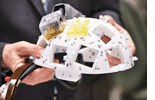Research & Development
Grant to revolutionize treatment of brain disorders
March 4, 2020
 TORONTO – The W. Garfield Weston Foundation, through its Weston Brain Institute, has made a landmark $16.7-million philanthropic grant to establish the Weston Family Focused Ultrasound Initiative at Sunnybrook.
TORONTO – The W. Garfield Weston Foundation, through its Weston Brain Institute, has made a landmark $16.7-million philanthropic grant to establish the Weston Family Focused Ultrasound Initiative at Sunnybrook.
This initiative is set to revolutionize the treatment of brain disorders such as Alzheimer’s disease, brain cancer and ALS.
With this grant, the Foundation is spearheading a $33-million initiative to develop and bring novel focused ultrasound technology to Canadians. The Weston Family Initiative will accelerate development of a powerful new focused ultrasound device to enable the personalized treatment of brain disorders as never before. This initiative will culminate in the launch of three world-first clinical trials and bring this breakthrough technology to more patients faster.
In what is believed to be the largest single philanthropic contribution to focused ultrasound in the world, this one-of-a-kind grant will also ensure a steady stream of resources for ongoing development of this game-changing technology and other related endeavors. If the device is commercialized, a portion of the income generated will be reinvested in Canadian focused ultrasound research and innovation.
The creative structure of this grant serves as a new template for philanthropic grant-making in Canada, one that may be scaled and modeled by other Canadian charitable foundations for the purposes of fueling discovery and potential reinvestment in homegrown innovation.
“We’re delighted to make this contribution to improve the treatment of brain diseases,” says Galen G. Weston, president of The W. Garfield Weston Foundation. “This initiative is a unique opportunity to accelerate the development of this breakthrough technology while encouraging leadership and innovation in the Canadian medical technology sector. The prospect of readying this device to benefit so many people in Canada and around the world is very exciting.”
“We are deeply grateful to The W. Garfield Weston Foundation for their early support for Sunnybrook’s pioneering work in focused ultrasound, and for taking this exciting next step,” says Dr. Andy Smith, Sunnybrook’s president & CEO. “On behalf of Sunnybrook, and so many Canadians who stand to benefit from better treatment for brain disorders, thank you for sharing our vision for a more hopeful future.”
A team led by Sunnybrook’s Dr. Kullervo Hynynen, physicist and vice president of research & innovation, is completing a prototype of this new ultrasound device. This breakthrough technology is nothing short of revolutionary. From one-size-fits-all to made-to-measure, the new device offers an unprecedented level of precision.
The device is being designed specifically to harness focused ultrasound to open the blood-brain barrier, the brain’s tightly packed network of vessels that both protects it from toxins and prevents potentially helpful agents from entering – such as chemotherapy, antibodies, stem cells or gene therapy.
“The new device is based on a model of personalization and portability,” explains Dr. Hynynen. “Each device will be custom-produced based on scans of individual patients. It’s also frameless, making it more economical for clinical use since it does not require the real-time use of MRI.
“And it’s more comfortable for the patient. Not only is it completely non-invasive, but it can treat multiple locations in the brain at one time, making the procedure shorter.”
With funds from the Weston Family Initiative, Sunnybrook’s experts can conduct research and device development on an accelerated timeline and achieve key outcomes in considerably less time than would otherwise be possible.
The primary goal of this initiative is to complete a prototype of the new device and demonstrate its efficacy in Canadians with various brain diseases. The Initiative’s ultimate ambition is to advance focused ultrasound technology so that treatments can be delivered quickly and without the need for MRI guidance, and to bring it to Canadian patients faster through clinical trials.
As part of the initiative, Sunnybrook’s clinical team, led by neurosurgeon Dr. Nir Lipsman, will test the device across three brain disorders: Alzheimer’s disease, breast cancer that has spread to the brain, and glioblastoma (the deadliest and most common brain tumour).
“This technology holds tremendous promise for patients with difficult-to-treat brain disorders like Alzheimer’s disease, brain cancer and ALS, where the blood-brain barrier is a major obstacle,” says Dr. Lipsman. “These are some of the most complex disorders that have no effective treatments, so we’re excited to move closer to testing the device in clinical trials. The impact of this technology on patient care will be felt across Canada and around the world.”
Sunnybrook Foundation will look to the generosity of the community to raise the remaining funds required to complete this bold new vision for the treatment of brain disorders.
About The W. Garfield Weston Foundation
For three generations, The W. Garfield Weston Foundation has pursued its mission to enhance and enrich the lives of Canadians. With a focus on health and landscapes, the Foundation aims to catalyze inquiry and innovation to bring about long-term change. Now in its sixth decade, the Foundation continues to collaborate with a broad range of Canadian charities to further world-class research, explore new ideas, and create tangible benefits for the communities in which it works.
About Sunnybrook
Sunnybrook Health Sciences Centre is inventing the future of healthcare for the 1.3 million patients the hospital cares for each year through the dedication of its more than 10,000 staff and volunteers. An internationally recognized leader in research and education and a full affiliation with the University of Toronto distinguishes Sunnybrook as one of Canada’s premier academic health sciences centres. Sunnybrook specializes in caring for high-risk pregnancies, critically-ill newborns and adults, offering specialized rehabilitation and treating and preventing cancer, cardiovascular disease, neurological and psychiatric disorders, orthopaedic and arthritic conditions and traumatic injuries. The Hospital also has a unique and national leading program for the care of Canada’s war veterans.
